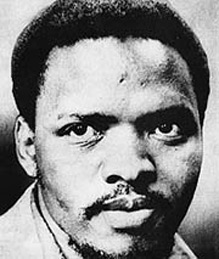Stephen Biko is known internationally as the founder of the South African Students’ Organization (SASO), and a leading force in the South Africa Black Consciousness movement. He fought against the separation between black and whites, called apartheid (the Afrikaans term for separateness). His childhood experiences and character, lead him to become a powerful leader.
Steve Biko was born on December 18, 1946, in King William’s Town, South Africa. He father was a clerk and his mother was a  housemaid. Following the Sharpeville massacre in 1960, Biko was just 17 years old when he became a political activist. He started to become active when he got expelled from Lovedale High School and his brother was arrested in a nationwide police crackdown on political activists. He ended up graduating in 1966 at a boarding school in Natal named St. Francis College.
housemaid. Following the Sharpeville massacre in 1960, Biko was just 17 years old when he became a political activist. He started to become active when he got expelled from Lovedale High School and his brother was arrested in a nationwide police crackdown on political activists. He ended up graduating in 1966 at a boarding school in Natal named St. Francis College.
By then, his mind and character were those of a leader. He had a quick brain with huge mental force and ideas. He had the gift to cut through to the core of a problem and find the best solution. “His mind was a tool to chisel out sense and truth and order” (Woods 78). Biko was thoughtful, sensitive and had a good sense of humor. He was motivated by the search for good and truth.
At the University of Natal Medicine in 1968, he became involved in the multiracial National Union of South African Students. He was known by peers and adults as a student leader; this organization fought for black rights, except he claimed that, “the white [were] doing all the talking and the blacks listening” (Biko 210). Biko wanted the blacks to have as much say and participation as the whites, so in 1968 he became the co-founder and first president of the South African Students’ Organization (SASO). This was an all-black organization, which aim was to raise self respect and reliance to all blacks. He said, “Black liberation starts with psychological self reliance. This can only be initiated in isolation from allies whose good intentions are an obstacle to such self-realization” (Woods 63). This organization helped the foundation of another movement and convention, known as the South African Students’ Movement, and the Black Peoples’ Convention (BPC). This movement also became known as the Black Consciousness Movement. The movements he founded were headed towards students, because they were the ones that might change their minds, unlike the older people, who have already made up their minds.
He published Black Review, which was a political journal for the black community. These movements and publications raised so much controversy that the black man is as worthy as any other person, that large numbers of people on school campuses and their community took part in protest, marches, and strikes against the government. This lead to banning of all SASO and BPC members in February 1973. The banning was when members were put on close watch by the police, restricting their associations, locations, movements, and public statements. Biko was restricted to the King William Town area. After the banning took place, Biko secretly organization what he called the Zimele Trust Fund in 1975 to help political prisoners and their families. That year and the next he was arrested repeatedly without a charge or trial. In 1976, he played a lead role in a trail which involved nine blacks prosecuted from “Alleged Subversion by Intent,” which means their thought and ideas were put on trial. Like Nelson Mandela, who was a generation before, he used the trial in the courtroom as a platform for the articulation of his philosophies and of black grievance. It turned out that the nine blacks were convicted and sentenced to prison for a minimum of five years. Black anger against white rule was now terrorism against the state and fair game for police intervention. In August 18, 1977 he and another fellow activist were arrested as security threats at a Security Police roadblock. They were put into jail at Port Elizabeth. For the next 24 days after his arrest, he was beaten and tortured. From this torturing, he suffered permanent brain damage, from blows to the head. He was then driven, while unconscious, 740 miles to a prison in Pretoria on September 11. He later died the next day at an age of 30. An autopsy showed that he died of untreated head injuries, but the police denied all of this. The death was not blamed on anyone.
The movie Trading Places, with Eddie Murphy, demonstrates Stephen Biko’s theory that a black man can do just as good as a white man, he just needs to be given the chance, and the correct environment.
There is a movie made on the book Biko, by Donald Woods, called Cry Freedom distributed by Universal Pictures. This movie shows the relationship between a white news reporter, Donald Woods, and the black activist Stephen Biko. It shows the inequality that blacks go through every day (Cry Freedom).
His death shocked the nation and people internationally. This was a turning point for South Africa. None of the rest of the world would buy goods or trade with South Africa. The new prime minister was quick to change laws, because if he didn’t act fast there could have been lots of riots, and South Africa might be shut off from the rest of the world forever.
